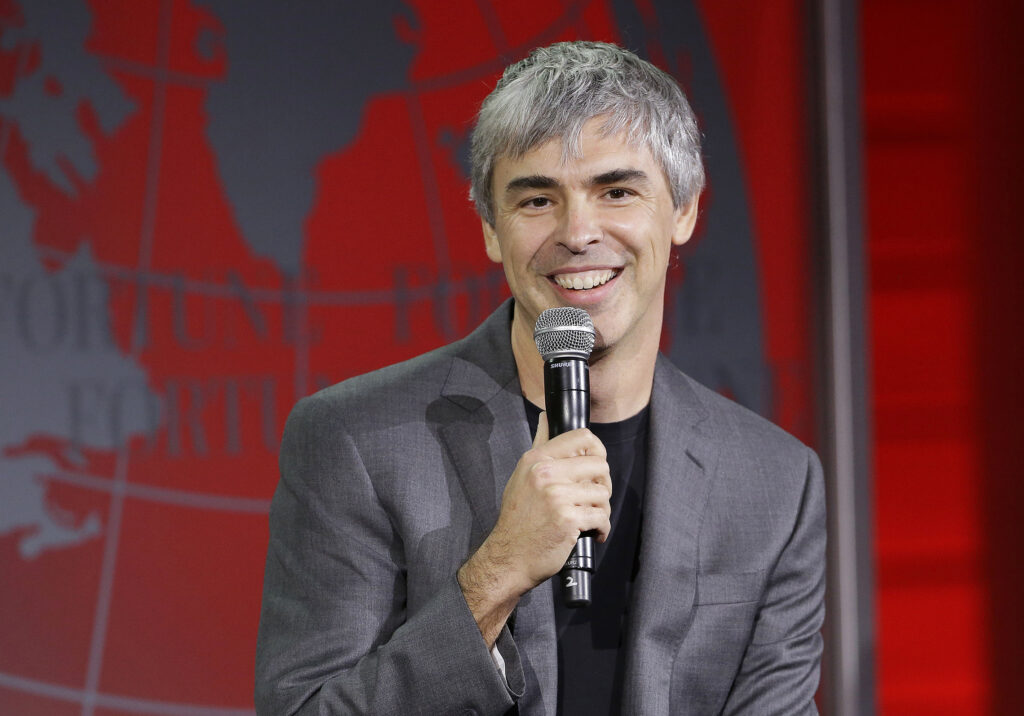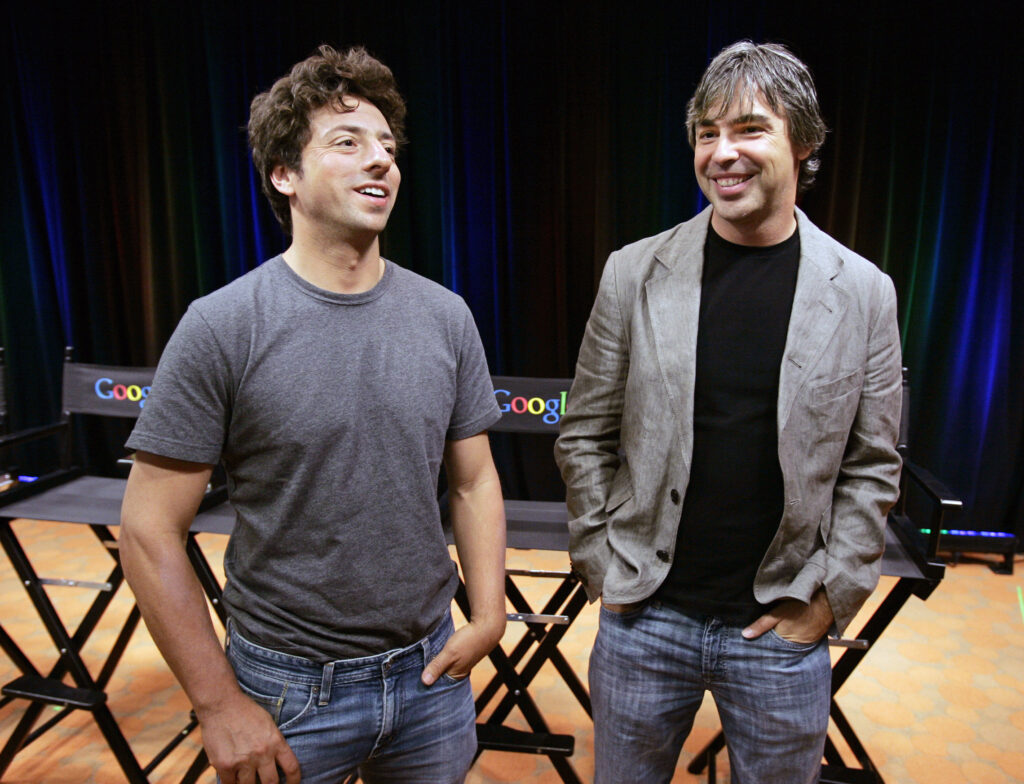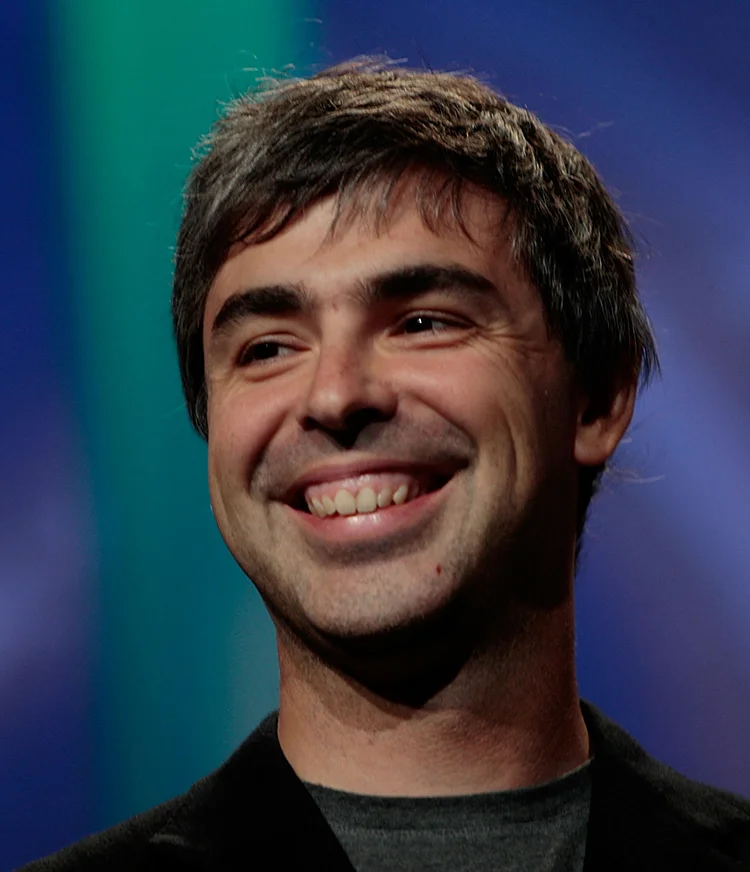Larry Page, synonymous with innovation and technological revolution, has left an indelible mark on the digital landscape. As the co-founder of Google, he has been at the forefront of shaping how we access and interact with information on the internet. His journey from a brilliant Stanford University graduate to the CEO of one of the world’s most influential tech companies, and later, his role in the restructuring of Google into Alphabet Inc., showcases his unwavering commitment to pushing the boundaries of what technology can achieve.
Delve into the life and career of Larry Page, providing a comprehensive look at the man behind the search engine giant, from his early years and educational background to his visionary leadership at Google and beyond. Exploring the fascinating journey of a tech luminary who has not only changed the way we search but has also made significant contributions to philanthropy, healthcare, and environmental conservation.
Early Life and Education

Larry Page’s journey into technology began with his early life and education. Born on March 26, 1973, in East Lansing, Michigan, Page exhibited an early aptitude for problem-solving and an insatiable curiosity. His father, Carl Victor Page Sr., was a computer science professor at Michigan State University, and his mother, Gloria Page, was an instructor in computer programming. This nurturing environment shaped Page’s interest in computers and technology.
Page’s academic journey was nothing short of exceptional. He attended Okemos Montessori School and later graduated from East Lansing High School. He then pursued a Bachelor of Science in computer engineering at the University of Michigan, graduating with honors. However, his pursuit of knowledge did not end there.
Larry Page’s true breakthrough came when he enrolled in the Ph.D. program at Stanford University. During his time at Stanford, he crossed paths with Sergey Brin, another brilliant mind in the making. Together, they embarked on a journey that would change the course of the internet forever.
Their Stanford research focused on improving how web pages were ranked in search engine results. This led to the development of an algorithm that would later become the foundation of Google’s search engine. As it was named, the PageRank algorithm aimed to provide users with more relevant and accurate search results by analyzing the linking patterns between web pages. This breakthrough laid the groundwork for the world’s most popular search engine.
Larry Page’s educational background and early interest in technology set the stage for his groundbreaking search and online information retrieval work. Little did he know that the seeds of innovation sown during his time at Stanford would grow into a tech giant redefining how we access information.
Co-founding Google

Larry Page’s partnership with Sergey Brin at Stanford University laid the foundation for what would become one of the most influential companies in the world—Google. 1996 Page and Brin began working on a search engine project called “Backrub,” later renamed “Google.” Their mission was clear: to organize the vast and ever-expanding realm of online information and make it easily accessible to the masses.
One of the key breakthroughs that set Google apart from existing search engines was the PageRank algorithm. This algorithm, developed by Page and Brin, evaluated the importance of web pages based on the number and quality of links pointing to them. It measured the web’s democratic nature, with popular pages receiving higher ranks in search results. This innovation marked a seismic shift in the world of online search and quickly garnered attention from investors and tech enthusiasts.
In 1998, Page and Brin incorporated Google as a privately held company; the rest is history. Google’s simple yet powerful search engine rapidly gained popularity due to its ability to provide users with highly relevant search results. It was only a short time before Google outperformed its competitors, such as Yahoo and AltaVista, regarding accuracy and speed, making it the go-to choice for internet users worldwide.
Google’s success continued beyond search. Under Page’s leadership as CEO, the company expanded its product portfolio to include email (Gmail), web browsers (Chrome), mobile operating systems (Android), and cloud services (Google Cloud). The introduction of Google’s advertising platform, AdWords, revolutionized online advertising, making it more targeted and measurable than ever before.
Larry Page’s vision extended beyond just search and advertising. He spearheaded ambitious projects like Google Maps, Google Books, and Google Earth, pushing the boundaries of what technology could achieve in various domains.
Google’s Rise to Dominance

Larry Page and Sergey Brin’s creation, Google, revolutionized online search and reshaped the entire internet landscape. Google’s rise to dominance was marked by several key factors that set it apart from competitors and solidified its position as the world’s leading search engine and technology powerhouse.
Algorithmic Precision
Google’s commitment to delivering the most relevant and accurate search results was unrivaled. The PageRank algorithm evaluated web page importance based on links and provided users with a more reliable way to find information online. This precision in search results became the gold standard in the industry.
User-Centric Approach
Google’s user-centric philosophy, encapsulated in its famous motto “Don’t be evil,” resonated with people. The clean, minimalist design of the search engine puts the user experience at the forefront. This approach earned Google the trust and loyalty of millions of users.
Continuous Innovation
Under Larry Page’s leadership, Google never rested on its laurels. The company constantly introduced new features and services to enhance the user experience. Innovations like Google Maps, Google News, and Google Images expanded the company’s reach far beyond simple web search.
Global Expansion
Google’s vision was global from the start. The search engine was available in multiple languages, and the company expanded internationally. Offices and data centers were established worldwide, making Google a global tech giant.
Monetization through AdWords
Larry Page’s strategic decision to launch AdWords, Google’s advertising platform, transformed the company’s financial outlook. AdWords allowed businesses to reach their target audience precisely, becoming a major revenue source for Google.
Acquisitions and Diversification
Google’s acquisition strategy under Page’s leadership was notable. Acquiring companies like YouTube, Android, and DoubleClick diversified Google’s offerings and ensured its relevance in the evolving digital landscape.
As a result of these factors, Google rapidly ascended to become the dominant force in the tech industry. Larry Page’s innovative thinking and dedication to providing the best user experience propelled the company to unprecedented heights.
Google’s dominance not only reshaped how people access information but also profoundly impacted industries such as advertising, publishing, and software development. It became a cultural icon and a verb in the English language, symbolizing the act of searching for information online.
Larry Page as CEO

Larry Page’s tenure as the CEO of Google marked a critical phase in the company’s history. His leadership style, innovative thinking, and strategic decisions profoundly impacted Google’s evolution and continued success. Let’s delve into his role as CEO and the key accomplishments during his leadership.
Return to the Helm
In 2011, Larry Page returned to the role of CEO, taking over from Eric Schmidt. His return signaled a shift towards a more product-centric approach. Page was known for his hands-on involvement in product development and commitment to Google’s core mission: to organize the world’s information and make it universally accessible and useful.
Embracing Mobile and Android
Under Page’s leadership, Google made significant strides in the mobile space. Android, the mobile operating system acquired by Google in 2005, flourished. Android’s open-source nature allowed it to become the dominant smartphone operating system worldwide. This strategic move positioned Google at the forefront of the mobile revolution.
Pushing Boundaries with Moonshot Projects
Larry Page strongly advocated for ambitious, forward-thinking projects known as “moonshots.” These projects aimed to solve complex global problems through radical innovations. Examples include Google X, which developed self-driving cars, and Project Loon, which aimed to provide internet access in remote areas via high-altitude balloons. Page’s willingness to invest in these high-risk, high-reward ventures showcased his commitment to pushing technological boundaries.
Unified User Experience
Page emphasized the importance of providing a unified user experience across Google’s products and services. This vision led to integrating various Google offerings, such as Gmail, Google Drive, and Google+, into a seamless ecosystem. This move aimed to enhance user engagement and keep users within the Google ecosystem.
Renewed Focus on Search
Despite Google’s diversification into various ventures, Page recognized the continued importance of its core search business. He emphasized improving search algorithms, enhancing the quality of search results, and adapting to the evolving needs of users in an increasingly mobile and voice-activated search landscape.
Commitment to Renewable Energy
Outside of Google, Larry Page displayed a strong commitment to sustainability and renewable energy. He invested in projects like Kitty Hawk, a company working on electric air taxis, and advocated for clean energy solutions. His philanthropic efforts extended to organizations dedicated to environmental conservation.
Larry Page’s tenure as CEO solidified Google’s position as a tech giant and showcased his dedication to innovation, user experience, and addressing global challenges. His strategic decisions shaped the company’s trajectory and laid the groundwork for Google’s continued success.
Beyond Google – Alphabet Inc.

Larry Page’s visionary leadership extended beyond Google as he played a pivotal role in restructuring the company into Alphabet Inc. This strategic move marked a significant transformation in the corporate structure and allowed Google to diversify its ventures while focusing on its core businesses.
The Birth of Alphabet Inc.
In August 2015, Larry Page and Sergey Brin announced the formation of Alphabet Inc. as Google’s parent company. This restructuring was driven by a desire to separate Google’s core businesses, such as search, advertising, and Android, from the more experimental ventures. Page assumed the role of CEO of Alphabet, while Sundar Pichai became the CEO of Google.
A Portfolio of Subsidiaries
Under Alphabet Inc., Google transformed from a single, all-encompassing entity into a conglomerate of subsidiary companies. These subsidiaries include Google, Waymo (self-driving cars), Verily (life sciences), DeepMind (artificial intelligence), and more. Each subsidiary was granted autonomy, fostering innovation and entrepreneurship within the Alphabet ecosystem.
Focus on Moonshot Ventures
Alphabet Inc. continued to embrace ambitious moonshot projects aimed at addressing global challenges. These ventures, often characterized by their audacity and complexity, reflected Larry Page’s dedication to pushing the boundaries of technology. For instance, Waymo’s autonomous vehicles and DeepMind’s advancements in artificial intelligence showcased Alphabet’s commitment to innovation.
Investment in Long-Term Goals
Larry Page’s leadership philosophy emphasized long-term thinking and sustainability. Alphabet’s investment in renewable energy projects and initiatives to make cities more efficient aligned with Page’s vision for a better, more sustainable future. His focus extended beyond immediate profits, emphasizing the importance of tackling pressing global issues.
Transparency and Accountability
Alphabet Inc., under Larry Page’s guidance, aimed to enhance transparency and accountability. The restructuring allowed for clearer financial reporting and accountability for each subsidiary. This move increased investor confidence and allowed the market to better understand individual businesses’ performance within the Alphabet umbrella.
Legacy of Innovation
Larry Page’s decision to create Alphabet Inc. allowed Google to explore new horizons and showcased his commitment to fostering innovation and addressing societal challenges through technology. His leadership style encouraged bold thinking and experimentation, leaving a lasting impact on the tech industry.
Larry Page’s role in forming Alphabet Inc. demonstrated his strategic understanding and desire to maintain Google’s innovative spirit while diversifying its interests. This transformation positioned Alphabet as a powerhouse in various sectors, ensuring that Google’s legacy would extend well beyond its search engine origins.
Philanthropic Efforts

Beyond his contributions to the tech industry, Larry Page has made a significant impact through his philanthropic endeavors. He has consistently committed to addressing some of the world’s most pressing challenges, particularly in healthcare, environmental conservation, and education.
Healthcare Initiatives
Larry Page’s philanthropic journey in healthcare includes investments in companies and projects to improve healthcare delivery and research. He co-founded Calico (short for California Life Company) in 2013, a subsidiary of Alphabet Inc., to tackle age-related diseases. Calico focuses on groundbreaking research to understand the biology of aging and extend human lifespan.
Life Sciences and Verily
Page has also been involved with Verily Life Sciences, another subsidiary of Alphabet Inc., dedicated to applying technology and data-driven insights to transform healthcare. Verily’s projects include developing smart contact lenses to monitor glucose levels in diabetics and collaborating on surgical robots that aim to make medical procedures more precise.
Impact on Education
Larry Page’s philanthropic interests extend to education, focusing on fostering innovation in this field. He and his wife, Lucinda Southworth, have contributed to educational initiatives, including donations to institutions like the Stanford School of Engineering. These contributions aim to support research and educational opportunities in the tech and engineering domains.
Conservation and Environmental Sustainability
Page has shown a deep concern for environmental sustainability. He has invested in projects dedicated to addressing climate change and environmental conservation. His support for clean energy initiatives and efforts to reduce greenhouse gas emissions aligns with his broader vision of a more sustainable future.
Ventures Beyond Alphabet
Outside of Alphabet, Larry Page has been involved in various philanthropic efforts, including funding innovative projects and startups through his investment vehicle, GV (formerly Google Ventures). This approach allows him to support promising ventures that align with his vision for positive change.
Larry Page’s commitment to philanthropy reflects a broader ethos of using technology and resources to address societal challenges. His healthcare, education, and environmental conservation initiatives demonstrate a dedication to making a lasting impact beyond the tech industry, striving to create a better future for all.
Conclusion
Larry Page’s journey from a curious child with a passion for technology to the co-founder of Google and visionary leader behind Alphabet Inc. is a testament to the transformative power of innovation and entrepreneurial spirit. Throughout his remarkable career, he reshaped the digital landscape, revolutionized how we access information and left an indelible mark on the tech industry.
Page’s role in co-founding Google and developing the PageRank algorithm elevated him to search technology’s forefront, forever changing how people navigate the internet. His commitment to precision, user-centric design, and continuous innovation propelled Google to dominate the tech world.
As CEO of Google and later as the head of Alphabet Inc., Page championed ambitious moonshot projects, diversified the company’s interests, and advocated for a sustainable future. His leadership philosophy prioritized long-term thinking, transparency, and accountability.
Beyond his corporate success, Page’s philanthropic efforts in healthcare, environmental conservation, and education have showcased his dedication to addressing pressing global challenges. His contributions extend far beyond business, leaving an enduring legacy of positive impact.
Page’s personal life, marked by a reclusive nature, a passion for aviation, and a commitment to family, adds depth to the narrative of a tech luminary who values balance and a multifaceted approach to life.
Influence beyond Google extends to cultural impact, entrepreneurial inspiration, and the reshaping of corporate structures. Larry Page’s life story inspires aspiring innovators and entrepreneurs, emphasizing the importance of audacity, persistence, and a focus on solving real-world problems.
In an era marked by rapid technological change and global challenges, Larry Page’s legacy reminds us of the potential for individuals to drive meaningful change and shape the future. His impact on the tech industry, society, and the world is a testament to the enduring power of innovation and the human spirit.
Larry Page, the innovator behind Google and the visionary leader of Alphabet Inc., will forever be remembered as a pioneer who dared to dream, push boundaries, and leave an indomitable mark on the world of technology and beyond.










